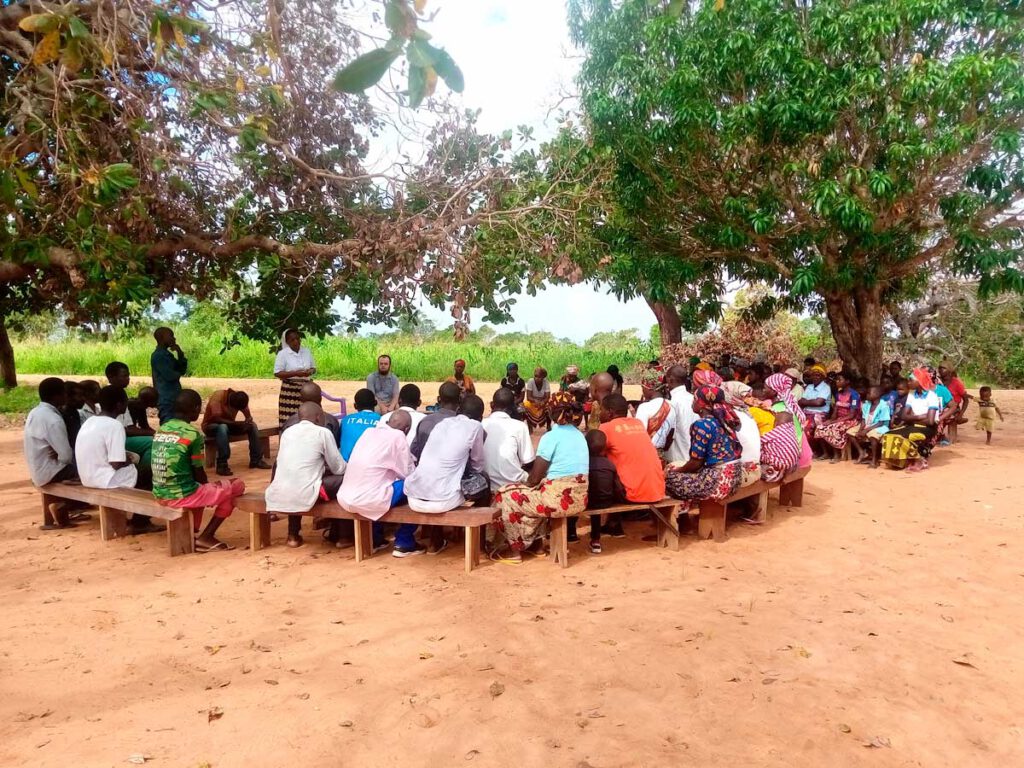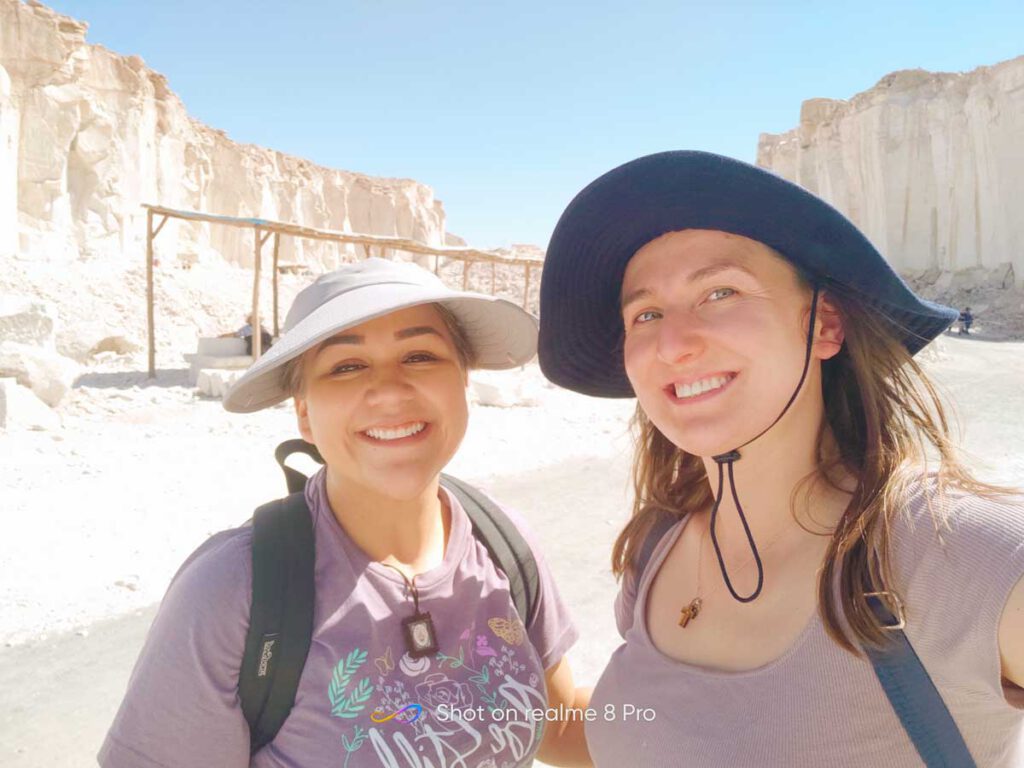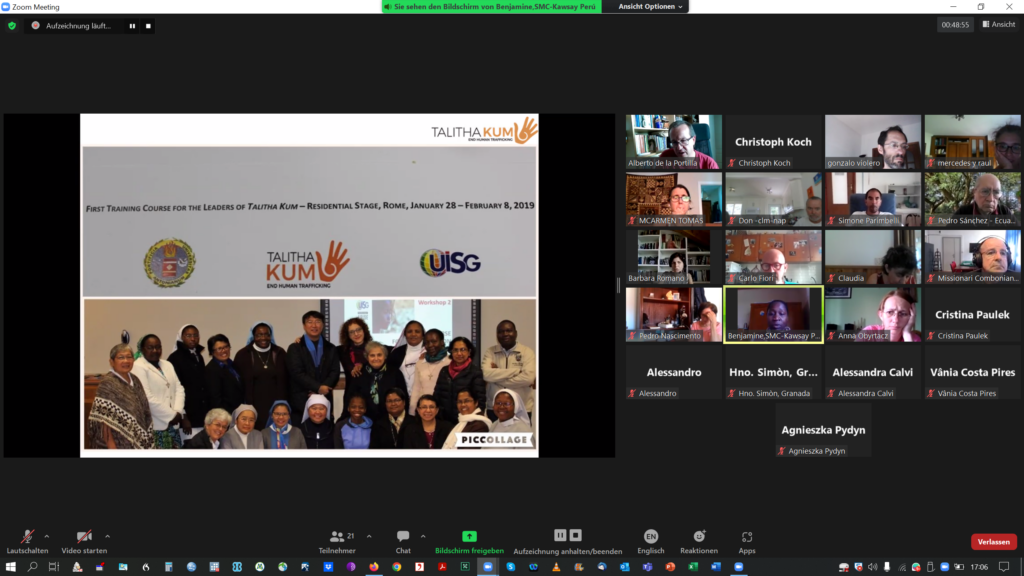
We pray for all the families in the most remote corners of the world who lack the most basic needs that they may feel the Lord’s company and receive a helping hand on their journey. Lord hear us.

We pray for all the families in the most remote corners of the world who lack the most basic needs that they may feel the Lord’s company and receive a helping hand on their journey. Lord hear us.
It has now been six months of our mission in Carapira, in the north of Mozambique. We would like to share with you about what our life looks like and what we do.
On March 1, we reach our place of work, the mission of Carapira. Long ago, it was planned that this village would become the seat of a diocese, so a church of impressive size was built. In addition to the would-be cathedral, there is also the Institute of Industrial Technology, founded by Combonians that attracts students from places located up to 150 km away with its reputation. Our responsibilities are divided between work in the institute (we are involved in the boarding school, secretariat, production, administration, agricultural part, library and computer room) and in the parish (we are members of the council for children and youth, vocations, education, Caritas and fraternal assistance and justice and peace). In addition, we prepare formation meetings for people from Mozambique who would like to become lay missionaries, we prepare adoration or sharing with the Word of God, we travel to distant communities (in our parish there are as many as 93 of Christian’s communities, sometimes traveling one way takes several hours, and the Mass, it is only celebrated once a year) and we have our household responsibilities. There is a lot to do and this is very good! The more responsibilities, the less time wasted, and the rest becomes a real respite.
As I mentioned, we experience a variety of problems. It was only a few weeks ago that the long-promised construction of a house for our community began. Until then, we live in the home of the Combonian missionaries. It also turned out that the repair of the car, used so far by our lay missionaries community, is completely unprofitable. This means that until we have the money to buy a new vehicle, the freedom of our work will be significantly limited.

We also had health problems. In total, in our community, we have already caught malaria nine times. Three days after arriving in Carapira, I fell ill for the first time. I felt very weak, so I went to the local clinic to get a quick test that confirmed my illness. Apart from the alternating waves of chills and fever, I had no symptoms. I was sweating very intensely, and the mattress on which I slept looked like someone had spilled a bucket of water on it. After three days of taking medications, you recover, but your body is weakened, and you should spare yourself for the next few days. This disease was inevitable. The region we live has a lot of cases of malaria. The previous Polish lay missionary, Kasia, was sick here fifteen times in two years.
From 10 to 11 March, the province of Nampula, where we live, was struck by the powerful cyclone Gombe, which killed at least 61 people and completely destroyed 45,079 houses. The relatively low death toll is the result of previous meteorological warnings. In simple houses, mostly built of clay and wood, no one slept that night, anxiously waiting for the cyclone to come. From 9 p.m. there was no electricity and one could feel a strong wind, which grew stronger at two in the morning. It was in complete darkness that trees and roofs broke, walls crumbled and people looked for shelter in terror. In Carapira, only a few of the most solid buildings have survived. Meteorologists noted that the wind force was 190 km/h and that heavy rain fell, corresponding to a 20 cm layer of water. Water penetrated through the cracks in the doors, windows and the ceiling also into our rooms.
Although we were observing the power of the element, we were not aware of the extent of the destruction for a long time and the morning proceeded peacefully. Suddenly Father Jaider, clearly shaken, came running, saying, “Many buildings are in ruins. There are lots of women with young children near the church. They are shaking with cold. They need dry clothes. We have to help them! We have to find shelter for them, they cannot enter the church. ” These last words surprised me a lot. I understand that the church is a sacred space, but the situation is critical, why can’t they take refuge there?
There was no time to ask questions. We ran to our rooms to look for warm clothes. Jackets, sweatshirts, pants, T-shirts. We came to the mission with heavy suitcases, an opportunity came very quickly to share with the most needy. With meshes full of clothes, we ran to the temple. Drenched people chattering their teeth, little ones shaking with cold. I looked inside. Water poured from holes in the ceiling, and stone parts of the ceiling fell. Now I understood why these people could not hide in the church building …
We separated the women and young children and ran with them to the nearby buildings of the former school. There was water in all the rooms, but at least one of them didn’t rain. We handed out clothes, mothers wrapped children in our jackets, sweatshirts, jackets … All the time we could hear the terrifying sound of bent sheet metal, which the element was still trying to break. This school has become a temporary shelter for the most disadvantaged. With considerable effort and at a cost, the roof in the remaining rooms was repaired. We brought mats that you could sleep on. We managed to organize two hot meals a day. We distributed roof repair foil, flour and beans to those most in need.

Many trees and an old, six-meter-long cactus fell down around the church. A group of teenage boys volunteered to help with tidying up the area. All the hot day they worked very hard with axes and machetes, carrying heavy branches and even cutting their hands. Their only payment was a cup of water with lemon juice and two cookies.
Five months have passed since the cyclone passed by the time you read this article. We are organizing a second wave of aid. We collected over 2,300 euros on the crowfounding portal. Together with people involved in the parish Council of Caritas and Brotherly Aid, we selected the most needy. It was not an easy task, as the local population is mostly very poor. We wanted to select people who are completely incapable of work and who cannot help themselves. We visited paralyzed, rheumatic, handicapped people, people with twisted limbs, undiagnosed diseases, amputees … They were very grateful for the few kilos of beans or cornmeal, for a blanket or mosquito-net, possibly some thin sheet metal to repair a broken roof. For those who can speak, we asked for a recording of thanks. They addressed people living somewhere in the unknown land of “Poland”, using hard-to-pronounce Polish names: “Piotr”, “Konrad”, “Mariusz”, “Pawel”, “Urszula”, “Wiesławie”, “Agnieszka”: ” thank you for your help ”.
People here live off of what will grow in small fields. Some cassava, some beans, some corn. This is enough for a poor diet. Meat or fish is a luxury. They work very hard, in heat and with simple tools, engaging even several-year-old children to help support their family. Your only chance to earn money is to sell some of your crops when the field is well fertile. Then they wander with 50 kg bags on their heads for many hours to the nearest market. In our village, a five-year-old boy swallowed a coin and an operation was required. His parents had to sell their piglets in order to get money for a trip to the city and bribes for doctors. Simple flip-flops or a used shirt at the market cost less than 1 EUR. Despite this, not everyone can afford such “excess”. Those who cannot afford it wear torn and worn clothes, sometimes barefoot.
Poverty, unimaginable for Europeans, and the lack of prospects do not break the Mozambicans. In the evenings they play music, humbly accept the hard life in all its fullness, react with undisguised joy when we greet them in the local macua language. It is worth remembering that another generation of our great-grandparents was in a similar situation. Various novels from the turn of the 19th and 20th centuries described similar poverty, the constant risk of hunger, illiteracy, superstition, difficult access to health care, and dependence on small plots. Today let us be grateful that our houses and flats have not collapsed, that we are not faced with hunger, that we can read and write, that we can heal our loved ones for free. May this gratitude always result in solidarity towards our hard-pressed sisters and brothers.
Regimar, Valmir and Bartek with kind regards
For the first six months of my mission in Arequipa (Peru), I lived in the house of the Combonian Fathers close to the parish church. With the arrival of Rossie – Comboni Lay Missionary from the United States, we were able to move to our new home in Villa Ecologica – the parish “district”, where we are to implement all our projects. During the pandemic, the owner of the house made a makeover, thanks to which each of us has her own room. Apart from that, we have a living room where we can have guests, a bathroom, a kitchen and … a garage. We don’t have a car, so we don’t use it, but it can be turned into an extra room at any time in case our community grows. When we go out to the street, we immediately notice the snow-capped peak of the Chachani volcano and the ubiquitous dust here 🙂
Due to the relatively short stay on the mission, we decided not to take a dog to defend the house, even though it is a very popular practice here. However, three neighborly mongrels decided that we looked quite nice and in exchange for additional food they offered their help as guards of the household. After a few weeks together, they even let themselves be petted and want to play with us. The only problem is their huge appetite, no matter how much food they have already received on a given day, they are always open to more. Our relocation coincided with the celebration of Independence Day in Peru.
On that day, practically every house had a red and white Peruvian flag. Father Conrado – the local parish priest asked us if we had put up a flag in our new apartment and explained that it was a civil duty and that people could get a fine for not having a flag. However, he laughed that when the mayor saw that a Pole and an American lived in the house, he would rather forbid us to hang the Peru flag 🙂

Ewelina, CLM Peru
After a well-deserved lunch break, we resumed the workshops with the missionary witness of the Portuguese community of Fetais. The Portuguese CLM decided last year to open a community presence in the outskirts of Lisbon. In a neighborhood with a great diversity of nationalities, where migrants from former Portuguese colonies in Africa stand out, but where there is also the presence of Latin Americans and people of Asian origin. All this with Portuguese, many of them of gypsy ethnicity.
All this great diversity makes living there a very different experience from what is usual in the rest of the country. Undoubtedly a melting pot of cultures that brings a lot of richness, but sometimes with many difficulties linked to their condition of exclusion.
This experience also gave rise to a debate on the rights of migrants in the European Union, the common policy that does not facilitate immigration and how the unequal demands of one country or another can also cause people to be more disadvantaged depending on local legislation.
Then the CLM from Spain helped us to deepen into a very elaborate presentation of the importance of political advocacy in our missionary action in Europe. To become aware of how Pope Francis encourages us to a positioning and an ever greater political responsibility as lay people because politics, as a service to the common good, definitely marks the lives of the people. How important is the influence on the change of legislations, the sensitization of the people for the different issues that affect so much as the care of the planet, migrations, etc.

The presentation was accompanied by the external intervention of Sister Benjamine who spoke to us about the work done by Talita Kum against human trafficking at the international level. Brother Simone spoke about the work of VIVAT International and the pressure they are trying to put on the UN and Geneva to change global policies, and Father Lorenzo shared with us the struggle of the Church and Mining network against abusive mining activities in Latin America. All of them reinforced the responsibility and the need for work in this sector that we have from Europe.
The last session of the day was in charge of the CLM from Italy, who presented several of the projects they are developing in different parts of the country. From the reception of migrants in the community La Zattera in Palermo. A place to organize their lives, to rest and to integrate into the new society.
In this line, Venegono explained to us the projects that they develop from Combinazione, such as the various shelters for refugees that they run, where they act from the first reception to a last resort on the way to an independent life where they facilitate the exit from the previous resources.
They also explained the work of awareness raising in schools. Bringing the realities of the world to children and young people, with awareness-raising projects adapted to different age groups, sometimes with the testimony of African migrants. Or even with the edition of a book that helps to enter and embrace more the reality of a changing society and the protagonism of everyone in this society, especially the youngest.
Finally, Simone shared with us the experience of life as CLM in the Comboni religious community of Castel Voturno and especially his work in the Black and White association that seeks to offer educational and leisure alternatives to the children of migrants who arrived in Italy and who even being born in Italy do not have the right to Italian citizenship. Also how this resource becomes the only place of leisure or study possibilities for these boys and girls due to the poor conditions of the neighborhood where they live.

To end this intense day we were able to have a time of quiet and prayer together organized from Spain. A simple prayer in different languages, where we could place at the Lord’s feet all that we have shared, the needs of all those we serve and our willingness to continue on the path wherever He calls us.
With the Our Father in each of our languages we closed this beautiful day of sharing and dreaming together from the gifts and services that each one of us develop. Surely it will have enlightened many for new initiatives and encouraged everyone knowing that we are together in this common cause which is the Kingdom of God.
A hug to all of you and thanks to those who participated because with your contributions you made us grow.
Alberto de la Portilla. CLM Central Committee